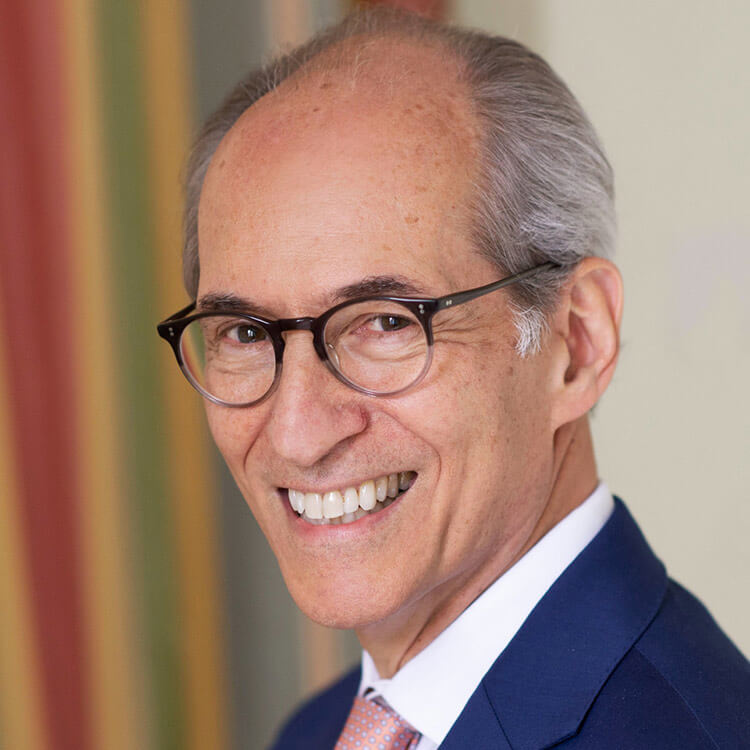Julian’s innovation was an orchestra ecosystem that endowed the musicians with freedoms and obligations of artistic leadership. The freedom to lead your section and select and interpret repertoire is balanced with the obligation to follow and support your colleagues when you are not a section leader. The mutual support and trust required to fulfill these contrasting roles unleashed intense commitment to collective success. This approach became a model emulated by subsequent generations of musicians and helped spawn a new breed of chamber orchestra. The success of the model attracted Harvard University to include Orpheus among its case studies on effective leadership.
After 26 years as executive director of Orpheus, including 18 years performing on four continents, Julian choose fatherhood over touring. Subsequently, together with composer Bruce Adolphe he co-founded The Learning Maestros, an education company that created new compositions, recordings, and curricula to help students, teachers, and families explore connections among the arts, sciences, environment, and issues of social conscience. Interdisciplinary events included Adolphe’s Tyrannosaurus Sue: A Cretaceous Concerto, performed by the Chicago Chamber Musicians in front of SUE the T. rex at Chicago’s Field Museum, and, in collaboration with neuroscientist Antonio Damasio and cellist Yo-Yo Ma, the world premiere of Adolphe’s Self Comes to Mind in Lefrak Theater at the American Museum of Natural History.
From 2000 to 2017 Julian served as strategic advisor and international booking and recording manager of the Venice Baroque Orchestra, helping establish them as one of the world’s premiere period-instrument ensembles. In 2004 he brought the ensemble to the Brooklyn Academy of Music and produced the first staging of Handel’s 1726 opera, Siroe, in the United States.
Having performed as cellist in almost 200 halls, Julian became interested in creating ideal aesthetic experiences for audiences and performers. In contrast with the “one-size-fits-all” limitation of the world’s great concert halls, he sought to identify performance spaces that matched the instrumentation, voices, and sonic scale of the music, as well as the composer’s intended performance venue. He created the Venice Music Festival (2004 – 2006), which fostered emerging talent, commissioned new work, and brought new life to neglected manuscripts. The pairing of music and space included Beethoven and Schubert keyboard works performed on fortepiano by Kristian Bezuidenhout in the salon of Palazzo Albrizzi; Trio Mediaeval singing in the 12th-century chapel of the Island of San Clemente; and the first modern-day stagings of two operas in the renovated 17th-century Teatro Malibran, Baldassare Galuppi’s Siroe (1754) and Domenico Cimarosa’s Olimpiade (1782).
In 2009, Julian was invited to serve as the executive director of the Italian organization Musicians For Human Rights (MFHR). Created by Italian horn player Alessio Allegrini, the mission of MFHR is to foster a culture of humanism through music. Julian helped produce fundraising concerts by the Human Rights Orchestra (HRO) to support the work of NGOs in many regions of the world (Democratic Republic of the Congo, Kenya, Palestine, Bolivia, Cambodia, etc.). Believing that “where there are humans, there are human rights abuses,” he also directed support to organizations in Italy and Switzerland to draw attention to the widespread human rights violations in democratic and wealthy countries. Projects included producing music-centered workshops for refugees and asylum seekers in Italy and Greece, organizing lectures on human rights for professional musicians, and introducing Carnegie Hall’s Lullaby Project in Italy. He helped design a three-year program in Lucerne at the confluence of music and human rights that brought together secondary school students and HRO musicians to study human rights and perform commissioned works on associated themes. The highlight was the 2014 commemoration of the 20th anniversary of the Rwandan Genocide. With “The Right to Culture” as the theme, youth in Rwanda and Switzerland performed for each other through live video linkage, and the HRO and Swiss students premiered Riccardo Panfili’s Last Land, inspired by a Rwandan lullaby. In 2022, Julian helped Fondazione Arturo Toscanini in Parma create Italy’s first city-wide program devoted to music and human rights.
His work with the Global Campus of Human Rights, the Fundamental Rights Agency of the European Union, and the Human Rights Centre of the University of Padua culminated with the recent publication of The Routledge Companion to Music and Human Rights. Julian was coordinating co-editor of the volume and contributed the chapters, “Why Music and Human Rights?” and “The Role of the Professional Musician in the 21st Century.”
A native New Yorker, Julian started playing the cello at age six, attended Bronx High School of Science, studied string quartets at the Juilliard School, and received his B.A. in liberal arts from Columbia University. He lives in Portland, Oregon.
